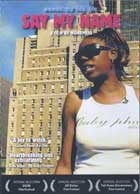
Say My Name 2009
Distributed by Women Make Movies, 462 Broadway, New York, NY 10013; 212-925-0606
Produced by Mamamess
Directed by Mamamess
DVD, color, 73 min.
Sr. High - Adult
African American Studies, Business, Careers, Popular Culture, Multicultural Studies, Media Studies, Sociology, Urban Studies, Women's Studies
Date Entered: 02/22/2010
Reviewed by Ciara Healy, Technical Services Librarian, Polk Library, University of Wisconsin-OshkoshSay My Name is a film about women and hip hop – both as creators and consumers of hip hop culture. Several female hip hop artists are interviewed and their opinions range across topics such as getting signed, misogyny in hip hop culture and their sources of inspiration.
One of the strengths of Say My Name is its inclusion - the film is international, intergenerational and regional in scope. Of the four women interviewed, women from the UK, from Detroit and Atlanta and immigrants to the U.S. are included - some are grandmothers now, and others quite young – barely teenagers. There is a general sense that, no matter where they are from, the female hip hop artist that can really “spit rhymes” is considered an oddity and a commodity and even given their skill, it is hard to break into the industry that is male dominated – from producers on down. What comes through most clearly is the determination of women hip hop artists to strive and succeed to be heard on their own terms.
To give a sense of the range of artists included, one of the first interviews is of Roxanne Shante, one of the first female rappers to get radio and television coverage in New York City in the early 80’s with her hit Roxanne’s Revenge. She was a young teenager at the time and her song was not actually released, but leaked. She was living at home at the time and wrote her own rhymes, coming from the tradition of battle MCs that was predominant in New York City in the early 80s. Gold record recipient Mc Lyte, who is still working as an MC in New York City, also is interviewed. She states, “Women’s names in hip hop have always been bigger than their album sales.” From these “old school” artists one gets a clear sense of how the industry has become more difficult to break into and succeed in, due to beauty standards, marketing and consumption of hip hop culture. Also shown are up-and-coming young hip hop artists such as Trinie, a protégé of Wyclef Jean, and Remy Ma, BET’s Best Female Rapper of 2005. Invincible, a young “hip hop activist” from Detroit claims hip hop can be a force for social change, addressing social conditions affecting urban communities.
A dozen female hip hop artist are shown speaking in their own words and commonalities that emerge across their experience include single parenthood, transforming personal experience into hip hop, domestic violence, urban culture, drug abuse, performance of female sexuality in hip hop culture (particularly video ho’s appearance in male rapper’s videos and conceptions of black women’s style) and, of course, getting paid.